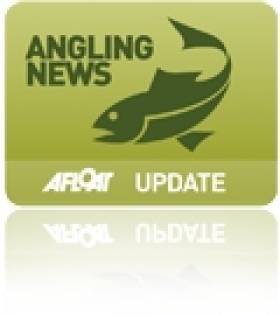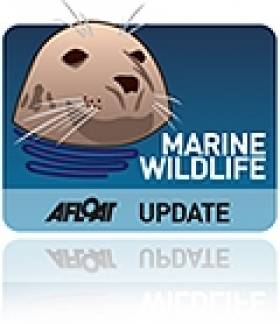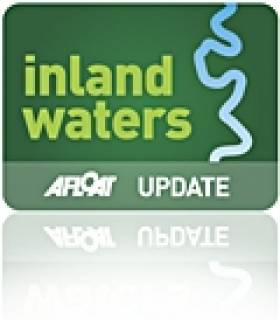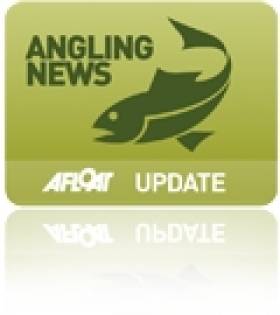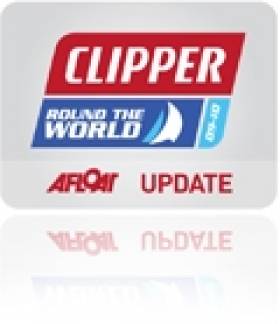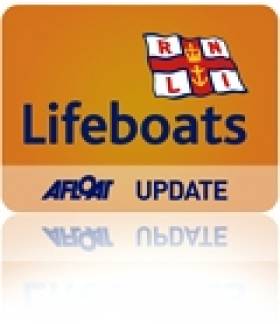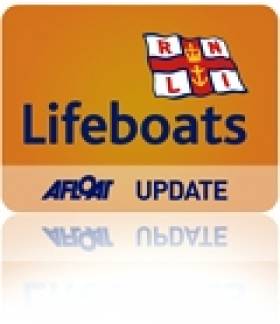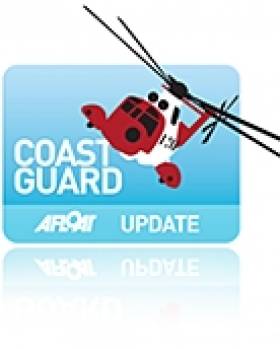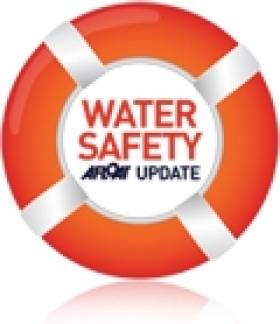Displaying items by tag: Northern Ireland
First Foyle Regatta For Sailors With Disabilities
#Regatta - The recently established Foyle Sailability will host its first regatta for people with disabilities in Derry this Thursday and Friday 16-17 May, as the Derry Journal reports.
Volunteers from Lough Foyle Yacht Club, Lough Swilly Yacht Club and Moville Boat Club will be on hand, joined by volunteers from Belfast Lough Sailability for the two-day event which marks the first time that a fleet of accessible dinghies has cruised together on the River Foyle.
People with disabilities across the northwest are invited to try out sailing for themselves by contacting Foyle Sailability at 71 266 593 or [email protected].
The regatta will meet at the Foyle Pontoon at Riverfront Walkway off Baronet Street from 11am to 3pm each day of the event.
English Anglers Take Top Spots At Lough Erne Classic
#Angling - London angler Peter Vasey topped the pack at the Waterways Ireland Classic Fishing Festival in Fermanagh recently, according to the Impartial Reporter.
Vasey's total catch across two sections at Crom on Upper Lough Erne - weighing in at an impressive 39.51kg - bagged him the £5,000 (€5,944) top prize, as well as a crystal chalice and a Diawa rod and reel.
The top three places all went to mainland Brits, with the highest placing local being Nick Seddon of Enniskillen who finished fifth overall.
This was the 10th year that Waterways Ireland has sponsored the Classic, which also featured top-flight angling action in the four-man team event.
The Impartial Reporter has more on the story HERE.
NI Marine Bill Progress Marks 'Turning Point'
#MarineWildlife - The Northern Ireland Environment Minister says the new Marine Bill put before Stormont marks a "turning point" for the North.
As 4NI reports, this week saw the fourth stage of the Marine Bill in the NI Assembly as well as the launch of a consultation strategy for Marine Protection Areas (MPAs).
Should it be enacted in legislation, the Marine Bill - strongly supported by the RSPB among others - would give the Assembly powers to select and manage Marine Conservation Zones (MCZs) to safeguard the North's marine biodiversity.
Minister Alex Attwood commented: "Northern Ireland’s seas are home to some of the world's most spectacular wildlife and habitats, and have the potential to power our nation through wind and wave and create thousands of new jobs.
"We have reached a turning point and must modernise in order to meet increasing and competing demands on our seas."
The Marine Bill also provides for the creation of a National Maritime Plan which covers all aspects of the marine environment from wildlife to investment in tidal and offshore wind power.
4NI has much more on the story HERE.
NI Minister Greenlights Ulster Canal Restoration
#InlandWaterways - NI Environment Minister Alex Attwood has finally announced planning permission to restore part of the historic Ulster Canal that has not been used since 1929.
The original Ulster Canal was completed in 1841 and linked the Erne System to Lough Neagh with a 93km navigation route. It was last used for trading boats in 1929 and officially closed two years later.
The application is to restore 14km of the navigational route in total - 5.5km or river navigation from Quivvy Lough to Gortnacarrow and 8.5km of canal from Gortnacarrow to Clones.
This will involve construction of the existing canal route and tow paths for public access on both banks. New road bridges are to be constructed at Derrykerrib, Wattle Bridge, Gortnacarrow and Clonfad/Munilly with three farm accommodation bridges.
The plan is to restore two existing canal bridges and a double lock at Gortnacarrow that will facilitate a rise from the River Finn to the canal section. A mooring of 170m with 32 car parking spaces and public toilets will be provided at Gortnacarrow. A picnic area and a further 20 parking spaces will be provided at the new bridge at Clonfad/Munilly.
Minister Attwood said: “The Ulster Canal restoration project has been a key heritage and tourist attraction for a long time, which has gathered momentum since the late 90s. Today is a turning point for the project. I hope the Planners’ green light means the project can accelerate.
“This is an example of cross-border initiatives working and working well. It follows from my announcement to give planning permission to the bridge at Narrow Water, linking Warrenpoint and Omeath.
“This cross-border project will be a boost for the people of Fermanagh, Cavan and Monaghan. It will re-open a historic waterway that has not been used for over 80 years and offers huge opportunities for regeneration and leisure-related activities for the entire region.”
Four accompanying applications for Listed Building Consent to carry out works to repair and restore three listed bridges and works to the Clones Aqueduct have also been approved.
Northern Ireland's Department of the Environment consulted Fermanagh District Council on its opinion to approve this application on 18 April 2013.
Monaghan County Council and Clones Town Council have signalled that planning approval should be granted for the Repubic side of the canal - although moves have been slow on that front.
Despite confirmation from Minister for Arts, Heritage and the Gaeltacht Jimmy Deenihan in April 2012 that the "main thrust" of waterways refurbishment is still focused on the reopening of the Ulster Canal, no significant moves have been made in the year since that statement, which came some months after a U-turn in Government funding for such projects.
Strategic Review Looks To Boost Angling in Northern Ireland
#Angling - The new Strategic Review of Angling initiative for Northern Ireland aims to encourage more people to get out fishing on Ulster's coastline and waterways.
The Belfast Telegraph reports on the scheme, developed by Sport NI and the NI Tourist Board, with the Loughs Agency, government and angling groups, as a two-pronged approach: promoting the sport at home and pushing Northern Ireland as a top destination for angling tourism.
"This is an exciting opportunity for us to help foster the interest in angling and enable the province to enhance its reputation for the quality of its fishing and the warmth of its welcome to visitors," said Geoff Hughes, director of consultants G&L Hughes Ltd who have been appointed to advise on how angling in NI might be best developed.
Meetings will be held next month where stakeholders can evaluate proposals and put forward their views, while an online survey is already soliciting the views of interested clubs and organisations.
The Belfast Telegraph has much more on the story HERE.
Irishman Among 'Dynamic Dozen' Skippers For Clipper Race
#Clipper - Irishman Sean McCarter is among the 'dynamic dozen' skippers selected to lead their amateur crews in the ninth edition of the Clipper Round the World Race.
The 31-year-old is looking forward to a home crowd welcome when the race visits Northern Ireland on its final leg in summer 2014.
He will be joined by the third ever woman to skipper a Clipper crew in 30-year-old Vicky Ellis from Bristol, who has paid her dues as a training skipper over three years.
The 12 yacht masters, selected from hundreds of possible candidates in a rigorous process, now begin their final training ahead of the race start in August.
But first comes the crew allocation on 11 May, when the race hopefuls - including two Irish challengers - will find out who they'll be sailing with.
Butcher Couple Eschews Anniversary Gifts for RNLI Donation
#RNLI - Rather than accept gifts for their 50th wedding anniversary, a Portstweart couple have asked their family and friends to make donations to Portrush RNLI.
As the Coleraine Times reports, Ewart Toms and his wife - who are well known butchers in the area - raised £500 for the RNLI which they were more than happy to hand over to lifeboat station volunteers at Portrush.
They said: “We wanted to mark this special occasion in our lives, by making a donation to a cause close to our hearts, and to the volunteers who risk their lives to save others.”
The Coleraine Times has more on the story HERE.
Busy Days For RNLI Lifeboats In Co Down
#RNLI - Newcastle RNLI’s always-on-call lifeboat crew had to abandon their buckets and sponges during a fundraising car wash at the weekend to respond to an emergency at the Co Down town’s harbour.
The RNLI volunteers were busily soaping and rinsing cars for their annual Easter fundraiser on Saturday when they were alerted to a woman in trouble in the freezing water a few yards from one of the piers.
The car wash was immediately abandoned and within minutes the inshore lifeboat Aldergrove II was launched and rushed to the woman’s aid.
At the same time, crew member Shane Rice grabbed a lifebelt from the pier and jumped into the water to assist the woman. He kept her afloat while the Aldergrove II came alongside.
The woman was helped into the rescue inflatable, wrapped in blankets to prevent hypothermia, and taken back to shore where an ambulance was waiting to take her to hospital.
Newcastle RNLI’s deputy launching authority Clifford Moorehead said afterwards: "The lifeboat crew are always ready to respond in an instant to any emergency. It is fortunate that the car wash was in progress at the time and the crew members were on hand to swiftly deal with this case.
"After the rescue the crew members came back to the harbour and resumed their car wash. It’s just all in a day’s work for the RNLI."
It wasn't the only callout of the weekend for the RNLI in Co Down, as Bangor RNLI assisted a lone sailor who got into difficulty on a sailing dinghy Easter Sunday.
At 1.10pm the volunteer lifeboat crew received an urgent request from Belfast Coastguard to launch the lifeboat and rescue one person from a 17ft dinghy.
The sailing dinghy had reportedly gone aground on ‘Cockle Island’ off Groomsport Harbour on the southern shores of Belfast Lough.
Upon arrival at the scene, the volunteer crew found that the occupant onboard the dinghy had been assisted by another boat owner and the vessel had been safely tied to a mooring buoy.
Meanwhile, last Wednesday evening Portaferry RNLI was launched to reports that red flares has been sighted on Strangford Lough off Kircubbin in Co Down.
They were joined by a coastguard team that searched the shoreline and after some time recovered a spent flare casing. The inshore lifeboat and its volunteer crew were stood down after a number of hours with the callout proving to be a false alarm.
Portaferry RNLI lifeboat operations manager Brian Bailie said: "A member of the public acted in good faith ... alerting the emergency services to what they understood to be a distress flare on the lough."
He reiterated that flares "should only be used in emergency situations".
Sligo Coastguard Chopper In Rescue Of 'Idiotic' Climbers
#Coastguard - A Limavady councillor says two men rescued yesterday from the snow-covered Benevenagh Mountain should be billed for the cost of their "completely idiotic" escapade.
The Belfast Telegraph reports that the Irish Coast Guard's Sligo-based Rescue 118 helicopter was involved in the major operation to retrieve the two men who became stuck while climbing a snow gully.
It also emerged that a PSNI search and rescue team had to be airlifted to the site by an Army Air Corps helicopter that had been involved in distributing animal food relief to farmers badly affected by the recent poor weather.
Limavady councillor Edwin Stevenson, who is also a farmer, said: "I am at an absolute loss as to why anyone would decide to climb Benevenagh in these conditions and can only describe the actions of these two men as completely idiotic."
He suggested that the NI Executive should consider "billing people who carelessly risk not just their own lives, but also the lives of the emergency services who invariably end up having to dedicate time and energy rescuing them".
The Belfast Telegraph has more on the story HERE.
NI Lifeguards To Feature In New TV Series
#WaterSafety - RNLI lifeguards in Northern Ireland are to feature on a new television series on UTV.
The Magazine starts on Sunday 7 April at 7.30pm with host Sarah Travers in her home town of Portstewart to introduce viewers to some of her favourite people, places and topics.
As part of the first programme, TV presenter Emma-Rosa Dias will find out what it takes to be a lifeguard with the RNLI when she visits the charity’s area support centre in Ballymoney - before being put through her paces by RNLI lifeguard supervisor Tim Doran to see if she is ready for the challenge.
After a test in the swimming pool, Dias experiences a slice of the real thing when she pays a visit to Portrush East Strand on the Causeway Coast, one of the five beaches in Northern Ireland which begins its Easter season on Good Friday tomorrow 29 March.
As previously reported on Afloat.ie, this lifeguard cover will run throughout Easter week until Sunday 7 April.
Filming took place on Monday afternoon and despite the unseasonal weather, the charity’s highly trained lifeguards took the opportunity to demonstrate that they will be ready to assist the visitors who will brave the elements and take a trip to the seaside over the Easter break.
Speaking following the afternoon’s shoot, Tim Doran said filming with UTV was a great way to show how highly trained RNLI lifeguards are.
"Our lifeguards spot potential dangers before they develop, and are on hand to give appropriate safety advice and respond immediately if anyone gets into difficulty," he said. "Because our lifeguards work closely alongside our volunteer lifeboat crews, it means the RNLI offers beach-goers and water-users a seamless rescue service from beach to open sea."
While Easter is often the time when people are getting back in the water after the winter, and while it’s good to see people enjoying the beaches, the RNLI is encouraging visitors to make sure they have the right kit to keep warm.
"It’s much colder now then it was this time last year," Doran added, "and our lifeguards will be wrapping up and we’d encourage everyone else to do the same. So, if you are heading into the sea, make sure you’re wearing a good wetsuit or drysuit, go with other people and keep an eye on each other.
"Keeping warm in cold weather can take a lot of energy, so fatigue can be an issue, plus watch out for the wind chill factor – even a slight breeze can have a dramatic effect on how cold it feels."
Meanwhile, to find out how Emma-Rosa Dias gets on, tune into UTV at 7.30pm on Sunday 7 April.



























